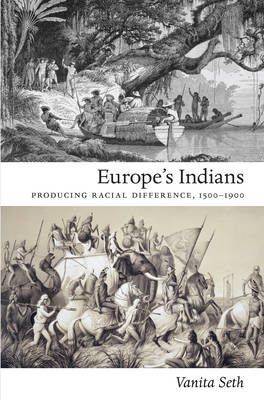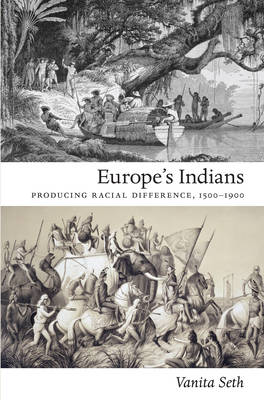
- Afhalen na 1 uur in een winkel met voorraad
- Gratis thuislevering in België vanaf € 30
- Ruim aanbod met 7 miljoen producten
- Afhalen na 1 uur in een winkel met voorraad
- Gratis thuislevering in België vanaf € 30
- Ruim aanbod met 7 miljoen producten
Zoeken
Omschrijving
Europe's Indians forces a rethinking of key assumptions regarding difference-particularly racial difference-and its centrality to contemporary social and political theory. Tracing shifts in European representations of two different colonial spaces, the New World and India, from the late fifteenth century through the late nineteenth, Vanita Seth demonstrates that the classification of humans into racial categories or binaries of self-other is a product of modernity. Part historical, part philosophical, and part a history of science, her account exposes the epistemic conditions that enabled the thinking of difference at distinct historical junctures. Seth's examination of Renaissance, Classical Age, and nineteenth-century representations of difference reveals radically diverging forms of knowing, reasoning, organizing thought, and authorizing truth. It encompasses stories of monsters, new worlds, and ancient lands; the theories of individual agency expounded by Hobbes, Locke, and Rousseau; and the physiological sciences of the nineteenth century. European knowledge, Seth argues, does not reflect a singular history of Reason, but rather multiple traditions of reasoning, of historically bounded and contingent forms of knowledge. Europe's Indians shows that a history of colonialism and racism must also be an investigation into the historical production of subjectivity, agency, epistemology, and the body.
Specificaties
Betrokkenen
- Auteur(s):
- Uitgeverij:
Inhoud
- Aantal bladzijden:
- 312
- Taal:
- Engels
- Reeks:
Eigenschappen
- Productcode (EAN):
- 9780822347644
- Verschijningsdatum:
- 3/08/2010
- Uitvoering:
- Paperback
- Formaat:
- Trade paperback (VS)
- Afmetingen:
- 155 mm x 231 mm
- Gewicht:
- 453 g

Alleen bij Standaard Boekhandel
+ 106 punten op je klantenkaart van Standaard Boekhandel
Beoordelingen
We publiceren alleen reviews die voldoen aan de voorwaarden voor reviews. Bekijk onze voorwaarden voor reviews.








